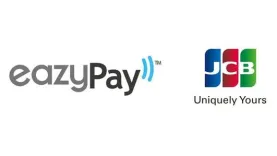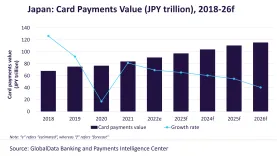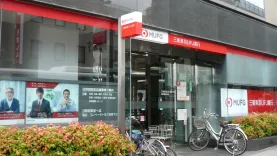Japan
Strong regional earnings boosts MUFG’s profits
Strong regional earnings boosts MUFG’s profits
In case of trouble, MUFG has a high likelihood of getting government support.
Mizuho Financial Group issues $817m green bond
Funds raised will be used to finance green projects, the group announced.
Japanese banks report lower average lending rates in July
City banks’ interest rates for short-term and long-term loans decreased.
Sumitomo Mitsui’s 2023 profit jumps more than three-fourths of the way
Net profit for 2023 was Y52.2t, versus the Y29.7t the previous year.
Mizuho partners with KOKO Networks to offer carbon credits to clients
Proceeds from the sale of premium carbon credits are distributed as substantial discounts on KOKO Fuel.
Mizuho Financial Group reports $1.71b in profits for Q1 FY2023
Net income per share of common stock is JPY96.75 for the quarter.
Mizuho Bank highlights innovation in new corporate tagline
It comes after the Japanese megabank launches its new medium-term business plan.
SMBC Group's Jenius Bank offers personal loans to US market
Jenius Bank plans to expand its services through savings products and a mobile app.
Mizuho Securities US aims for 100 hires by next year
The Japan-headquartered company said it aims to expand its workforce by 30% by 2026.
SBI Holdings now own 53.74% stake in SBI Shinsei Bank: report
Shinsei is preparing to delist and return $2.43b in public funds.
Japanese regulator sounds out megabanks on China geopolitical risks: report
Its three megabanks have a total credit exposure of $64b to China.
JCB cards now serviceable through EazyPay in Bahrain
JCB card holders can now be used through the Bahrain-based service provider.
UOB opens 10th FDI Advisory Centre in Japan
Since its launch, the advisory unit supported about 4,000 companies investing in the region.
JCB reduces GHG emissions by 54.4% in 2022
It also shared the initiatives which took place last year.
Japan’s card payments market to be worth $742.2b in 2023
Growing consumer preference for electronic payments will push a 7.5% growth in value.
Japanese insurers, banks to build sustainable finance platform
The collaboration seeks to build a digital platform for investment institutions.
MUFG Bank buys JPY600m shares in metaverse company TBT Lab
The bank will help develop the financial functions of the planned Japan Metaverse Economic Zone


















 Advertise
Advertise

















Commentary
Asia’s banks hold the mandate to innovate. Now they must earn it.
Why Asia's banks are rebuilding their credit infrastructure in 2026
Banks retreat, private credit advances: Asia Pacific’s quiet lending revolution
Human Sparsity Blockchain: A citizen-validated ledger for digital finance supervision
Will stablecoins disrupt the banking business?
Digital transformation starts with leadership